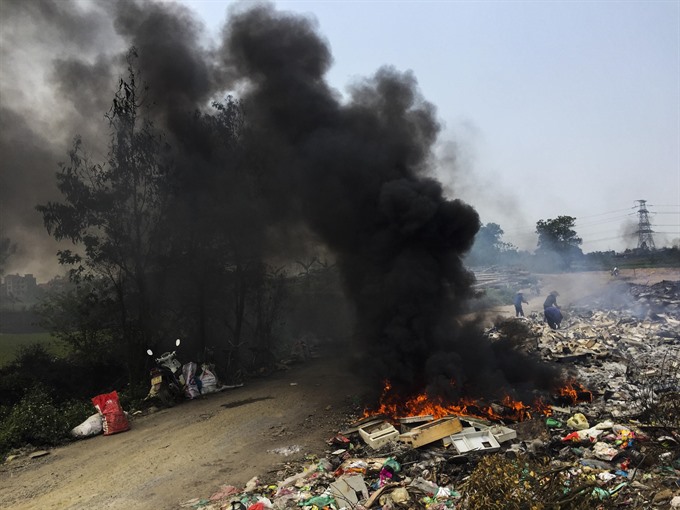 Society
Society

Việt Nam has gradually improved its legal framework to control persistent organic pollutants but there remain challenges in tackling environmental problems, according to experts.
 |
| Waste is burned outdoors in Văn Môn Commune, yên Phong District in the northern province of Bắc Ninh. Open waste burning not only causes temporary environmental pollution but also poses risks of POPs emission. — VNA/VNS Photo Diệp Trương |
HÀ NỘI — Việt Nam has gradually improved its legal framework to control persistent organic pollutants but there remain challenges in tackling environmental problems, according to experts.
They were speaking at a workshop on managing waste and minimising open burning, organised on Wednesday by Natural Resources and Environment Information Centre under the environment ministry.
According to Việt Nam Environment Administration (VEA), on July 22, 2002, Việt Nam ratified the Stockholm Convention on Persistent Organic Pollutants — an international environmental treaty. The convention aims to eliminate or restrict the production and use of persistent organic pollutants (POPs) which are “chemical substances that persist in the environment, bio-accumulate through the food web, and pose a risk of causing adverse effects to human health and the environment”.
POPs are unintentionally formed and released from thermal processes involving organic matter and chlorine due to incomplete combustion or chemical reactions, for example from waste incinerators, cement kilns, burning of waste and others.
As of June 2018, there are 182 parties to the convention, including 181 states and the European Union. Notable non-ratifying states include the US, Israel, Malaysia, and Italy.
After the ratification, Việt Nam developed and completed legal frameworks on POPs including the Law on Environment Protection 2014, Government Decree 19/2005/NĐ-CP on implementing some articles of the law, Decree 38/2015 on waste management and the Natural Resources and Environment Ministry’s circular on imported scrap.
Nguyễn Như Trung, from the VEA’s Waste Management Department, said under the law on environmental protection, discharging untreated waste, toxic or radioactive substances into soil, water sources and air is banned.
The waste must be managed in production, reduction, classification, collection, transport, recycling and destruction.
Owners of production, trade and service establishments have to reduce, recycle and regenerate energy from the waste they produce or transfer the waste to functional agencies to do it for them.
Trung added that in a national strategy on solid waste management, Việt Nam targeted managing waste comprehensively based on its life cycle.
The strategy focuses on reducing waste and promoting reusing and recycling, Trung said, adding that waste was considered a resource that requires properly-selected sorting/collecting technologies.
However, so far, in Việt Nam, solid waste has not been managed effectively. With a population of more than 93 million people, there are about 35,000 tonnes of solid waste produced in urban areas daily and another 34,000 tonnes of solid waste produced in rural areas daily.
Major cities like Hà Nội and HCM City produce 7,000-8,000 tonnes of solid waste.
It was reported in 2017 up to 80 per cent of landfills in the country failed to meet hygienic requirements.
Additionally, there are about 400 medical waste incinerators nationwide and small-sized outdated incinerators in rural areas. The incinerators with outdated technology don’t have waste emission treatment facilities, causing a high risk of releasing pollutants.
Open burning of straw and other agricultural waste not only causes temporary environmental pollution but also poses risks of POPs emission.
Dr Trần Thế Loãn from the Việt Nam Environment and Nature Protection Association said Nam Sơn Waste treatment complex in Hà Nội was the only one in Việt Nam that generates power from waste. Its factory can deal with 75 tonnes of waste, producing 1.93 MW daily.
Vice head of Việt Nam Environment Administration Hoàng Văn Thức said that despite improved legal frameworks, Việt Nam faced challenges in addressing environmental issues, including POPs management.
For example, there is a lack of specific regulations on open burning, making the bad practice rampant.
He called on the public and agencies to take stronger actions to reduce and respond to environment-harming activities, emphasising that improving public awareness of the issue would be a key to effective environmental protection. — VNS




